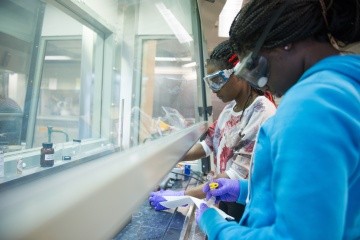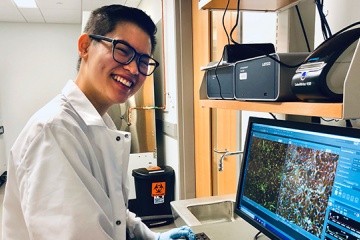Amy Hitchcock Camp
she/her
- Associate Professor of Biological Sciences
- Co-Chair of Biological Sciences

Amy Hitchcock Camp investigates how bacteria—once assumed to be antisocial organisms—“talk” with one another to coordinate complex biological processes. More specifically, she studies the bacterium Bacillus subtilis (a harmless relative of the Anthrax-causing bacterium Bacillus anthracis), which can transform itself into a metabolically dormant and environmentally resistant spore.
This primitive developmental process involves two sister cells that work together so that one of them can become a spore. (The other cell ultimately dies.) In her research, Camp “eavesdrops” on these two sporulating cells to discover the elegant and unexpected ways that they communicate and control gene expression.
She has determined that the two sporulating cells engage in an entirely unexpected mode of cell-cell communication in which one cell appears to “feed” nutrients and metabolites to the other via a unique channel apparatus. This “feeding tube model” has broadly reframed current thinking as to how bacteria can communicate at close range and is a significant focus of research in her laboratory at Mount Holyoke. Camp and her students are also pursuing a second line of related research, aimed toward dissecting the regulatory mechanisms required for the precise “switch” from early to late gene expression in the developing B. subtilis spore.
Camp’s research has been published in journals including Genes and Development, Molecular Microbiology, and Proceedings of the National Academy of Sciences. In July 2012, she was awarded a $200,000 Academic Research Enhancement Award (AREA) Program Grant from the National Institutes of Health (NIH) to continue her research into “switches” in gene expression.
In September 2012, Camp received a prestigious $1.5 million NIH Director’s New Innovator award. This grant will allow Camp and her collaborators to undertake a high-risk/high-reward line of experimentation to provide direct and comprehensive evidence for her paradigm-shifting “feeding tube” model for bacterial cell-cell communication.
Camp earned her A.B. in Molecular Biology from Princeton University and went on to receive her Ph.D. and postdoctoral training in the fields of cell/molecular biology and microbiology at Harvard University. Between her Ph.D. and postdoctoral training, she served for one year as a visiting assistant professor at Mount Holyoke. She returned to Mount Holyoke in 2012 as an assistant professor; she teaches courses in cell biology and bacterial cell biology.
Areas of Expertise
Bacterial cell-cell communication and gene regulation
Education
- Ph.D., Harvard University
- A.B., Princeton University


